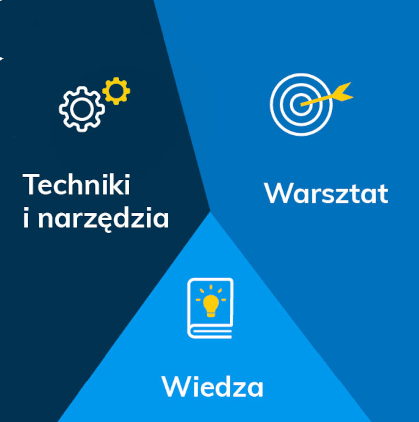Złap rabaty na szkolenia w lipcu i sierpniu. Latem mniej nawet do -290 zł netto za uczestnika Sprawdź szkolenia w promocji

Team management and employee motivation training
Training versions:
online | stationary | mix | closed: Warsaw / Poland
Employee motivation ↑ 300%
The team's commitment is higher when the manager ensures that employees are properly motivated and manages the team properly. Training at 4GROW will change your existing beliefs about management and motivation by 180 degrees.
33 = 17 + 10 + 6
During the training, you will receive 17 tools, 10 techniques and 6 models from us to gain 300% more motivation and commitment of the team.
Your task is to implement. And reap the harvest.
4.96 ♥ / 5
This is the average satisfaction rating of 390 participants of 60 editions of team management training on a scale of 1-5, over the last three years.
or
Training effects
During the Team Management training, you will learn:
- Motivating, inspiring and engaging the team, especially non-financially.
- Enforcing assigned tasks and disciplining reluctant employees.
- Delegating goals and tasks.
- Fair settlement and evaluation of employees.
- Building the image of a leader, especially towards older, more experienced employees or, until recently, peers.
- Developing the team and making it independent in its development.
- Building a team that cooperates and supports each other in achieving common goals for which they feel co-responsible.
- How to use the coaching management style as a transformational leader
- Management through your and company values and managing employee and team values
Our Team Management Trainings are full of practical tools ready for you to use!
They have already benefited from the training – what are their impressions?
Thank you for your individual approach and appropriate exploration of team management topics. I am inspired to develop my managerial and leadership skills. Training with just the right amount of fun!
During the team management training , I discovered how many opportunities there are to motivate employees. It was a big surprise how important it is to find out the beliefs and values, as well as to examine the needs of employees. As I am at the very beginning of the team management journey, I need and want to think about and implement this content, which will certainly result in a lot of questions and doubts. I am glad that I will be able to get answers to them thanks to the post-training contact included in the package, because I really need a mentor. I can confidently recommend this team management training to people who need to be guided by a mentor, and not just participate in the training.
We conducted training for:
Choose the optimal training variant
If you are looking for team management training in a nutshell - you are in the right place :)
If you are looking for a more extensive training than Team management and employee motivation in a nutshell, i.e. one in which you will gain more managerial tools, you will have more practice and which will meet your current challenges of management, select the appropriate level of the Manager Academy below.
You are not sure which level of training within the Manager Academy to choose?
- take a test to determine your managerial level and recommend the level of training!
Only 4 questions, it will take you 10 minutes!
Take the Management Test with a training level recommendation!
Training program: Team management and employee motivation
1. How to keep employees motivated? Principles and practical techniques - motivation 3.0
You will discover the power of the psychology of motivation and learn and receive practical tools that will help you keep your employees motivated at the highest level.
- The 10 strongest universal, preventive non-financial motivators , stronger than a raise
- What is the importance of needs in motivating and how to use them in motivating? Maslow and Herzberg's theory with a practical tool for its application
- How to motivate Generation X/Y/Z (Millennials) ?
- How to regularly check the level of motivation and react on an ongoing basis to prevent it from decreasing? Practical tool: Motivation Matrix™
- What is Motivation 3.0 and why does the "carrot and stick" model no longer work?
- What rewards and how to use them so as not to lose employee motivation?
2. From feedback, through supporting development,
to enforcing and disciplining a reluctant employeeYou will learn to provide your employees with constructive feedback, based both on the so-called pure feedback, as well as elements of the so-called feedforward. You will learn to escalate your techniques to the strongest ones when your previous requests, tips, questions and feedback have failed!
- Feedback - how to talk to an employee to gently draw his attention to "development" areas? I will teach you some powerful techniques that, when properly understood and used, will bring the desired results.
- Feedback with feedforward elements - when you want to provide appreciative feedback or when you want to accelerate positive changes and feedback alone is not enough: the ZFPUP technique.
- Does your employee not follow orders? Refuses? Or he says he will do something and doesn't do it? In your real professional situations, I will show you the most effective enforcement and discipline techniques in difficult situations. Everyone will practice these techniques from the perspective of the boss and the "disciplined" and experience their effectiveness: 4AS™ - an advanced original technique that you will take care of implementation and the relationship.
- Recovery program for subordinates - a practical tool and tips for the most difficult managerial situations.
- Development interview and questions building responsibility and proactivity on the employee's side - practical tips and techniques.
3. Delegation, settlement and efficiency assessment
- Mistakes in delegation
You will see what mistakes 90% of managers make in the process of setting goals using goal setting sheets (e.g. MPD, MPO, IPD, etc.), as a result of which this process is a parody and periodic evaluations are unfair. - How to delegate, i.e.:
- how to plan the division of tasks to relieve yourself of operational work - two practical tools that will help you with this: the 4GROW™ delegation model and 6 Levels of Delegation according to Harvey Sherman ;
- what language and phrases to use for delegation, depending on the effect you want to achieve, the employee's competences and your relationship - elements of neurolinguistics in delegation.
- SMART is not everything. You will learn our original SMART-UP model and discover how to set goals (and tasks) for employees:
- at the operational and managerial level
- learners and specialists/experts
- creative and formulaic
- committed and lazy
- How to settle and evaluate
- What criteria should be adopted for settlement and evaluation to make it fair?
- How to determine objective and measurable success indicators?
- How to motivate to improve with a fair assessment?
- You will learn an extremely simple, effective and practical tool that will help you conduct periodic evaluation conversations - thanks to this technique, your employees will be sure of a fair evaluation. Additionally, this tool will help you diagnose the competences/talents of your subordinates.
- Mistakes in delegation
4. How to manage a team and what management style to choose?
- Situational management according to Hersey-Blanchard - how to recognize an employee's maturity to optimally match the management style, tools and techniques:
- R1 - enthusiastic newcomer
- R2 - disappointed adept
- R3 - competent-careful practitioner
- R4 - independent expert
- How to match your management style to the situation and employee:
- styles by Blake-Mouton
- styles by Hersey-Blanchard
- Situational management according to Hersey-Blanchard - how to recognize an employee's maturity to optimally match the management style, tools and techniques:
5. The role of the manager in team management
Employee management is both a process and a cycle - in order for a leader to ensure the effective work of his subordinates in his organization, he should have time to perform 4 basic managerial functions:
- organization
- delegation
- motivating
- settlement
During the training, you will learn techniques and tools that will help you perform the above functions and will also make up the entire employee management cycle, which is also the link that connects all the training elements:
- Defining goals and tasks
- Research on employee needs, motivators and demotivators
- Delegating tasks and responsibilities
- Monitoring the implementation of tasks and support in the implementation of tasks adequate to the employee's competence level
- Enforcement based on performance indicators
- Assessment of the level of project/task implementation and employee effectiveness
- Summary – periodic conversation and setting a development path
Additionally, the tools and techniques that you will practice and receive as a takeaway will help you counteract the Five Dysfunctions of Teamwork (according to Patrick Lencioni's model ), such as: lack of trust, fear of conflict, lack of commitment, responsibility and attention to results. You will learn more tools for building effectively cooperating, united teams at level II of the training.
Throughout the training, the trainer will pay attention to your language and body language in the context of building your authority as a leader - neurolinguistics is powerful knowledge that will help you consciously use words!
Lead your team to the heights of motivation and commitment...

The trainer will ask about your needs and propose an optimal program FREE
You can talk to a coach today about your problems and needs and make sure they are met. And they will be fulfilled, even if they go beyond the team management and motivation training formula, because only with us the "program" means more than just training:

The trainer will take care of you during EXTRA individual training FREE
When you want to tackle a challenge that goes beyond the team management and motivation training program, but is related to its topic, or prepare for an important and difficult situation, practice and make sure that you optimally apply the learned techniques - you have 90 minutes alone with the trainer , within one year of training. Apart from that:

The trainer supports you by phone without any hours limit FREE
After all, after the training, we start to see more, so new questions arise. And a helping hand is useful to combine the wealth of knowledge and techniques acquired from our Team management and motivation training with your life. Additionally:

Access to the training platform FREE
After the training, each participant receives unlimited access to the 4GROW online platform, where they can preview training materials, use exercises and tools, read the list of recommended books and use the forum.

Your training will be 100% FREE
Because we do not cancel training. For each training there is information about whether the training date is already guaranteed. Team management and motivation training is guaranteed from just 1 participant!

Group training after training FREE
Every few months, we organize 2-hour group trainings, during which you have the opportunity to further practice in front of the audience and receive feedback from the trainer and participants - thanks to this, you can further develop your skills and refresh your techniques!
See for yourself how pleasant and effective development can be!

Małgorzata Jabłońska
Psychologist and business practitioner, soft skills trainer, bilingual coach and mentor certified in the USA
Certified clinical psychologist. She completed master's studies at the Faculty of Psychology of the University of Warsaw, as well as 4-year doctoral studies at the Institute of Philosophy and Sociology of the Polish Academy of Sciences as part of the Soros Foundation.
A business practitioner with 30 years of experience working in the corporate world in top managerial positions - in Poland, the region of Europe, Africa and the Middle East and in the USA. She has gained extensive experience in effective management of human teams - in multicultural environments, working on international and global projects at various stages of building corporate structures, in the departments of market research, business analyzes and the development of global innovations.
Trainer of trainers in the field of leadership and managerial skills training, team management and presentation (certificates obtained in the USA). He specializes in management and leadership, managing change in an organization, effective communication and conflict resolution, forum speeches and business presentations, as well as managerial coaching and mentoring.
Creator of original training and workshop programs, an experienced trainer and business presentation practitioner with extensive experience in introducing international training standards to the business world in Poland.
An expert in the field of innovative teaching methods - co-author of innovative solutions for teaching SGH students, also cooperating with PWSBiA in Warsaw and Collegium Verum, Postgraduate Studies.
Training methodology
W naszych szkoleniach dostajesz właśnie w takich proporcjach:


Techniki i narzędzia konkretne strategie działania adekwatne do sytuacji i optymalne narzędzia (np. formularze, scenariusze rozmów, matryce, ściągi) – gotowce, które wiesz jak wykorzystać na co dzień
Warsztat dzięki ćwiczeniom grupowym, grom, pracy w parach, na gorącym krześle, prowokacjom, wdrażasz nowe techniki i narzędzia, doświadczasz omawianych mechanizmów na sobie także w zaskakujących eksperymentach
Wiedza niezbędne informacje, teorie przełamujące schematy i mity, badania i odkrycia z różnych dziedzin: psychologii, neurobiologii, coachingu, NLP
- Team management and motivation training is conducted in workshops - participants practice the techniques and tools they learn in a very diverse way.
- Everyone receives training materials, exercises and tools (forms, cheat sheets, planners, etc.).
- One of the benefits of the training is access to the 4GROW training platform, where:
- all training materials are embedded and
- is a forum for written communication with the trainer and training participants on this topic, enabling asking questions and exchanging experiences.
- Online participants connect via a video-training platform with the trainer (and participants in the room, if they have registered as part of the Mix form).
Your comfort in comfortable armchairs!
and a maximum of 10 people in the room
Why do participants value our team management training?
Team management and motivation training dates
| TERMINY | WARIANT SZKOLENIA | LOKALIZACJA | |||
|---|---|---|---|---|---|
| 2025-07-21 - 2025-07-22 |
|
Warszawa
|
Zarezerwuj | ||
| 2025-07-28 - 2025-07-29 |
|
Online
|
Zarezerwuj | ||
| Do uzgodnienia |
|
Mix: Online lub dowolne miasto | Zapytaj | ||
| 2025-08-25 - 2025-08-26 |
|
Warszawa
|
Zarezerwuj | ||
| 2025-09-22 - 2025-09-23 |
|
Warszawa
|
Zarezerwuj |
Team management training - who will benefit from it?
Team management is an area consisting of very broad knowledge and competences acquired from training - after all, someone who manages a team should have a higher level of at least soft competences than the employees in his team. Training in this field will allow you to increase your level of competence and equip you with the necessary techniques that will make it easier for you to manage a team. The training is also a great opportunity to exchange experiences between managers who practice team management on a daily basis. In this article, you will learn:
Contents:
- Team management - definition
- Managing teams or motivating employees
- How to manage a team
- Team management training
- Effective team management
- Team management course
- Team management PDF, book
Team management - definition
Team management is the influence on team members as well as the processes and relationships between them that result in the achievement of the goals delegated to them and strengthen the bonds between employees, as well as between employees, the manager and the company.
Managing teams or motivating employees
Why team management is necessary - after all, it is enough to recruit motivated employees, send them to training and take care of their motivation - one might think completely unreasonably. What happens that causes employees to become demotivated, and is motivation the only reason why you need to manage a team?
Answering the first question - after some time, a motivated employee begins to get bored with his tasks, and this is a natural process that the manager is supposed to counteract thanks to team management training. Moreover, the company's management board needs information from its managers, and these - from employees, which is why one person, a manager, is needed to collect this information and pass it on, understanding the context and perception of the company's management board. The management board, if it has undergone appropriate team management training, also has a vision of the company and its development, so it needs managers who will translate this vision into goals and the goals into tasks. Finally, employees must be held accountable for these goals in order to evaluate and reward them fairly. The manager is also a person who receives first-hand information from the management board - and therefore is supposed to provide this information to employees, teach them, support them in their development (including by sending them to appropriate team management training).
How to manage a team
As you can see from the paragraph above, team management training is more than just motivating employees - team management, in the simplest model, consists of 4 functions performed by a manager:
- Organizing work - that is, equipping the employee with all knowledge (including vision, values) and competences
- Delegating tasks
- Motivating employees - including examining needs, using motivators and enforcing them
- Settlement - including: monitoring and evaluation, and we start the cycle again from the beginning - that is, based on the assessment, we set the employee's vision of changes
To effectively manage a team, you need to develop the above managerial functions depending on the stage at which the employee is - this is what the model: Situational Management by Hersey and Blanchard says:
- There is no need to motivate a new employee (he wants to but is not able to), because he is highly motivated, we perform the rest of the functions (including organizing - i.e. sending him to appropriate training).
- An employee who has been working for a while begins to make mistakes because he is learning, and therefore begins to demotivate (he does not want to and is not yet able to) - we use all 4 functions (motivation training is very useful here).
- An employee who has already learned how to perform his duties begins to achieve success - you must remember that before his motivation returns, he must accumulate some successes (he can, but does not want to yet), so we perform all 3 functions on him, apart from organizing (here training is least important).
- An employee who has already achieved some success - motivation returns again (he wants and can) - we do not have to motivate and organize, we perform the other two functions.
- An employee who has been performing his duties for a long time begins to get bored and his motivation decreases (he does not want to, but he can do it) - therefore, it is very important that, in addition to delegating new tasks and holding him accountable for them, we also place great emphasis on motivating him, and preferably prevent this situation by using preventive motivation at every stage. Very often, these are employees at the expert stage, for whom the next stage of their career may be a managerial path, and the first step to it - training in team management and employee motivation.
Team management training
Team management training can and should teach you more than the above models - these are already known and theoretical models. You should expect specific techniques and tools from team management training that will constitute your complementary team management workshop. It is the application of these techniques that will ultimately determine the quality of your management. The training should therefore give you techniques for all 4 functions, e.g.
- Team management techniques for organizing: management by values (MBV), exposure, building a vision, coaching style of employee development
- Team management techniques for delegation: SMART(UP), goal grid, management by goals (MBO)
- Team management techniques for motivation: motivation grid, Wind in the Sails™, Motivational Algorithm™, 4AS™
- Team management techniques for accountability: STAR, goal grid, periodic assessment, ZPZU, development interview
If you want to learn the above techniques and master effective team management, sign up for our training!
Effective team management
To manage effectively, a manager needs to gradually progress through subsequent levels of leadership as the team's competences and expectations develop. Each management level increases team management competencies in the following order, through our following Team Management training courses :
- Personally effective manager
- A business-effective manager
- Effective leader of a committed team
- Charismatic leader
Our training will allow you to go through all managerial levels and become a real leader!
Team management course
You have to come to the training, but not to the course. Taking an online team management course is a very good idea for busy managers who are motivated enough to watch a team management course on their own in the evenings or weekends, internalize knowledge and discoveries and then implement them into their work. If you are not so motivated, it is better to come to a stationary team management training, cut yourself off from work for two days and enjoy the effects of the training and the fact that you immediately have the opportunity to practice - practicing all the techniques. If you choose a team management course, the exercise remains on your side. Additionally, in case of questions and doubts that always arise when implementing new knowledge, it is worth making sure that such a course includes some form of contact with a trainer.
Team management PDF, book
Managing a team requires acquiring knowledge that no one teaches us at school, sometimes we acquire it during studies in a very academic form, or during training - in a very practical form, therefore a valuable source of supplementing knowledge in this field are PDF files or a book containing tips on managing a team, which you treat as an addition to team management training. It would be ideal if the book or PDF contained specific team management case studies or team management techniques - it is worth checking the table of contents or a fragment of the book before purchasing it to invest your time in a good source of knowledge!












